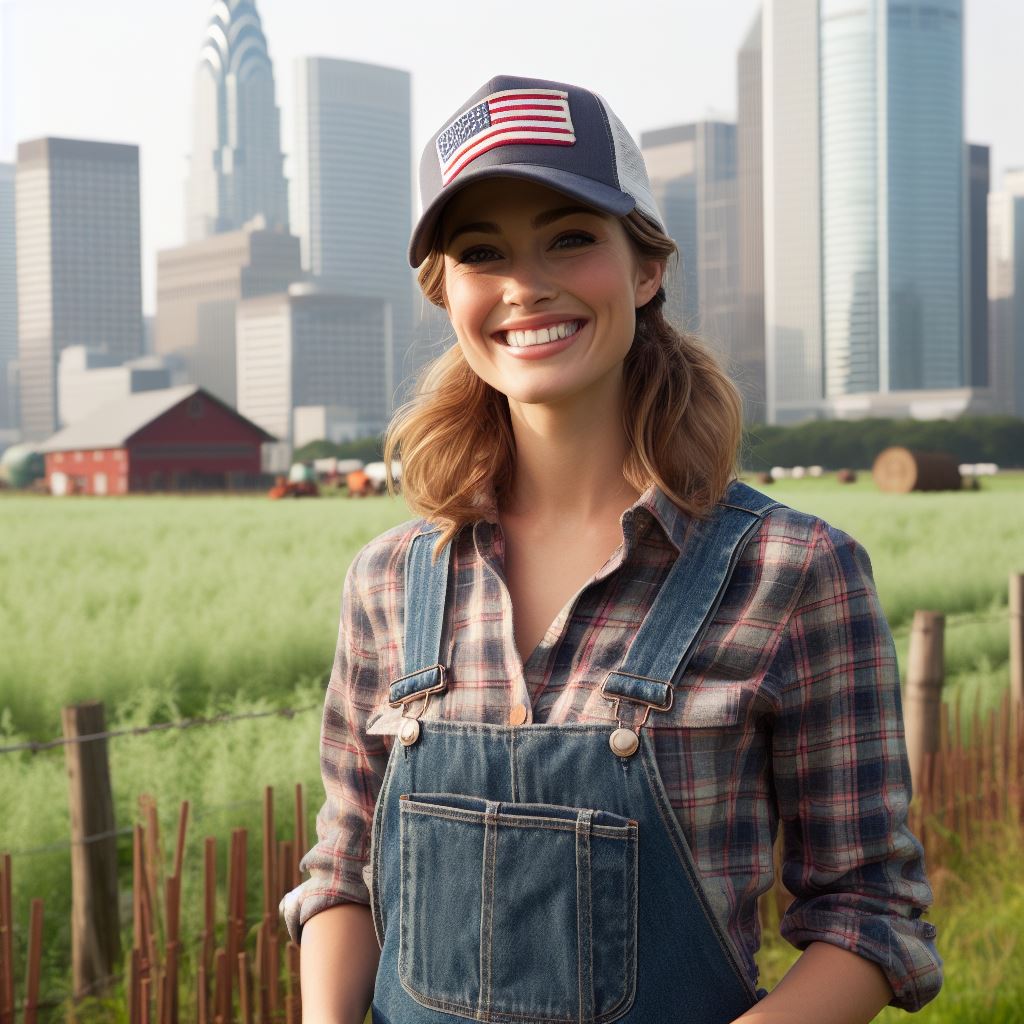Introduction
In the heartlands, Harvest Queens reign supreme, embodying resilience and nurturing.
They lead, inspire, and cultivate abundance. Women in agriculture are the backbone, shaping landscapes and feeding nations.
Their toil sows sustenance, their vision transforms fields. In every crop’s cycle, women’s hands nurture life, their expertise enriching harvests.
From planting to harvest, their stewardship ensures bounty, their dedication fuels communities.
In the tapestry of agriculture, women weave threads of innovation, sustainability, and growth.
Their leadership fosters resilience, their wisdom guides generations forward.
Beyond stereotypes, they command respect, proving prowess in every aspect of farming.
The significance of women in agriculture is undeniable, their contributions indispensable to global food security.
As Harvest Queens, they reign with grace, intelligence, and strength, shaping the landscape of tomorrow.
In fields and boardrooms, their voices resonate, advocating for equality and empowerment.
They are the guardians of our sustenance, the architects of our food systems.
Let us celebrate the women who rule the farmlands, honoring their legacy and championing their ongoing journey.
History of Harvest Queens
Historical background on the tradition of Harvest Queens
- The tradition of Harvest Queens dates back centuries, originating from agricultural societies seeking bountiful harvests.
- In ancient times, Harvest Queens were chosen to represent fertility and abundance in agricultural communities.
- These queens were considered the embodiment of the land and were revered for their role in ensuring successful harvests.
- The tradition of Harvest Queens spread across different cultures and regions, adapting to local customs and beliefs.
- During medieval times, Harvest Queens were often selected through festivals or competitions to display various skills and qualities.
- They would be crowned with wreaths made from crops and paraded through villages, showering blessings on the land and its people.
- Harvest Queens were seen as mediators between humans and nature, responsible for maintaining harmony and prosperity in farming communities.
- As societies evolved, Harvest Queen ceremonies became more ceremonial and symbolized the connection between agriculture and civilization.
- From Europe to Asia and the Americas, the tradition of Harvest Queens persisted, with each culture infusing its unique customs and rituals.
- Throughout history, Harvest Queens were admired for their beauty, grace, and the vital role they played in agricultural societies.
Origins and cultural significance of Harvest Queens
- The origins of Harvest Queens can be traced back to ancient harvest festivals celebrated by agricultural civilizations.
- These festivals were a way for communities to express gratitude for a successful harvest and seek blessings for the next season.
- Harvest Queens were chosen to represent the fertility goddesses or female agricultural deities in various cultures.
- By embodying these deities, Harvest Queens symbolized the natural cycle of life, growth, and abundance.
- The crowning of a Harvest Queen marked the beginning of the harvest season and signified the importance of agriculture in society.
- Harvest Queens were often responsible for leading prayers, rituals, and ceremonies to ensure a bountiful harvest.
- Their presence brought a sense of unity, hope, and inspiration to farming communities, reaffirming their connection to the land.
- Throughout the years, Harvest Queens evolved into symbols of female empowerment, highlighting the crucial role women played in agriculture.
- These queens were revered as leaders, healers, and nurturers, embodying the strength and resilience required for farming.
- Today, many parts of the world celebrate the tradition of Harvest Queens, preserving the farming culture’s rich heritage.
The history of Harvest Queens is a testament to the deep roots of agriculture in human civilization.
These queens symbolize the essential connection between humans, nature, and the cycle of life.
Through their leadership and representation, Harvest Queens remind us of the significance of the land and the contributions of women in farming communities.
The tradition of Harvest Queens continues to thrive, bridging the gap between ancient customs and modern celebrations of abundance and gratitude.
Read: Urban to Rural Shift: First-Gen Farmer Diaries
Modern-Day Harvest Queens
Role of women in contemporary agriculture
Women have emerged as influential figures in the male-dominated agricultural industry.
They are breaking stereotypes by actively engaging in farming and assuming leadership roles.
Modern-day harvest queens are spearheading innovative practices and contributing to the sector’s growth.
How women have overcome challenges in the industry
Despite facing numerous obstacles, women have persevered and triumphed in the agricultural realm.
They have shattered gender barriers and tackled stereotypes, proving their capabilities in all aspects.
By embracing education and technology, women have made significant strides in transforming the sector.
Examples of successful female farmers and their contributions
- Karen Martinez: As the owner of a thriving organic farm, Martinez champions sustainable practices.
She promotes environmental responsibility and educates fellow farmers on eco-friendly farming methods. - Samantha Turner: Turner revolutionized the dairy industry by introducing automated milking systems.
Her innovations have improved efficiency, minimized labor, and empowered other female dairy farmers. - Maria Hernandez: Hernandez established an inclusive farming community that prioritizes diversity and empowerment.
Through mentorship programs, she has uplifted aspiring female farmers by providing guidance and support. - Olivia Thompson: Thompson specializes in urban farming, utilizing small spaces to grow fresh produce.
Her efforts have revitalized local communities, promoting healthy eating options and food sustainability. - Emma Miller: Miller pioneered the use of precision agriculture techniques to optimize crop production.
Her use of drones and data analysis has resulted in higher yields, reducing resource wastage in farming.
These examples highlight the significant contributions women make in contemporary agriculture, influencing positive change.
Through their determination, expertise, and passion, they are transforming the agricultural landscape and inspiring future generations.
Read: Wall Street to Wheat Fields: Unlikely Farm Paths
Skills and Qualities of Harvest Queens
The essential skills and qualities needed for success in farming
- Knowledge and expertise in various farming techniques, including crop cultivation and animal husbandry.
- Physical stamina and strength to withstand the rigors of agricultural work.
- Strong problem-solving skills to address challenges such as droughts, pests, and diseases.
- Adaptability to changing weather conditions and market demands.
- Effective communication skills to interact with suppliers, buyers, and fellow farmers.
- Financial acumen to manage budgets, investments, and sales.
- Leadership abilities to coordinate and manage farm operations.
- Time management skills to optimize productivity and meet deadlines.
- Passion for agriculture and a genuine love for working with nature.
- Continuous learning and willingness to stay updated with the latest agricultural practices.
Misconceptions and stereotypes about women in agriculture
- Women are not capable of physical labor: Women in agriculture demonstrate their physical prowess and resilience daily, busting this myth.
- Farming is a man’s job: Women have been integral to agriculture throughout history, contributing significantly to food production.
- Women lack the necessary knowledge and skills: Women in agriculture possess expertise and skills on par with their male counterparts.
- Women are not taken seriously in the industry: Women farmers face challenges, but their competence and determination shatter this stereotype.
- Farming is not a suitable career for women: Women have proven their mettle in farming, successfully balancing family and agricultural responsibilities.
- Women are limited to certain roles on the farm: Women excel in various roles like managing finances, marketing, and decision-making on the farm.
- Women are not innovative in farming practices: Women bring fresh perspectives, embracing technology and implementing sustainable farming methods.
- Women cannot handle the business aspect of farming: Women farmers are adept at managing finances, negotiating contracts, and expanding market reach.
- Women are not respected in male-dominated farming communities: Women’s valuable contributions are increasingly recognized and respected in agriculture.
- Women in farming lack support systems: Women farmers are part of strong networks that provide guidance, mentorship, and empowerment.
In fact, successful women in agriculture, the Harvest Queens, possess a diverse set of skills and qualities.
From physical stamina to financial acumen, they showcase their competence and overcome misconceptions and stereotypes.
Women in agriculture are an indispensable force, contributing significantly to the growth and sustainability of the industry.
Read: Tech Pro to Farmer: A Modern Agri Story

Discover More: New Kids on the Farm: Their Inspiring Tales
Challenges Faced by Harvest Queens
Obstacles and Gender Disparities Faced by Women Farmers
- Access to Land: Many women farmers face challenges in accessing and owning land for agricultural activities.
- Financial Constraints: Lack of access to credit and financial resources hinders women from investing in modern farming techniques.
- Education and Training: Limited educational opportunities and technical knowledge pose barriers for women in agriculture.
- Social Norms and Stereotypes: Deep-rooted gender biases often result in women being underestimated and undervalued in farming.
- Unfair Wages: Women farmers frequently earn less than men for the same work, limiting their economic independence.
- Health Risks: Exposure to harmful chemicals and heavy physical labor can have negative impacts on women’s health.
- Technology Gap: Limited access to agricultural technology and modern equipment hampers women’s productivity and efficiency.
- Limited Representation: Women often face challenges in attaining leadership positions and decision-making roles in agricultural institutions.
- Lack of Social Support: Inadequate networks and supportive services leave women farmers dealing with various challenges on their own.
- Climate Change: Women farmers are disproportionately affected by climate change due to their dependence on natural resources.
Efforts to Promote Gender Equality in Agriculture
- Policy Reforms: Governments and organizations are implementing policies to address gender disparities in agriculture.
- Financial Inclusion: Initiatives provide women farmers with access to credit, savings, and insurance services.
- Capacity Building: Programs offer education and training to enhance women’s skills and knowledge in farming techniques.
- Empowerment and Advocacy: Efforts promote women’s rights and provide platforms for their voices to be heard.
- Land Reform: Land redistribution programs aim to provide women with equal access and ownership rights.
- Gender-Responsive Extension Services: Services tailored to the needs of women farmers help bridge the knowledge gap.
- Gender-Integrated Farming Programs: Promoting gender balance in agricultural activities enhances productivity and income.
- Addressing Social Norms: Awareness campaigns challenge stereotypes and promote gender-equitable attitudes in agriculture.
- Networking and Support Group Initiatives: Creating supportive networks and communities for women farmers to share experiences and knowledge.
- Climate-Smart Agriculture: Implementing sustainable farming practices that take into account gender-specific vulnerabilities to climate change.
Overall, the challenges faced by women farmers, also known as Harvest Queens, are numerous and complex.
Various efforts are actively addressing these obstacles and promoting gender equality in agriculture.
By addressing issues such as access to resources, education, representation, and social norms, women farmers can overcome these challenges and further contribute to sustainable rural development.
Read: New Farmers’ Journey: From City to Soil Tales
Empowering Women in Agriculture
Agriculture has traditionally been a male-dominated industry, but there is a growing recognition of the important role that women play in farming.
In recent years, organizations have developed several programs and initiatives to support and uplift women in agriculture.
Programs and initiatives that support and uplift women in farming
- Women In Agribusiness Development (WIAD) program provides training and financial support to women in rural areas.
- The Women’s Agricultural Leadership Network (WALN) offers networking opportunities and mentorship for aspiring female farmers.
- International organizations like Heifer International empower women farmers through education and access to resources.
- Local governments often establish women-focused agricultural cooperatives to promote entrepreneurship among rural women.
- Non-profit organizations, such as the National Women in Agriculture Association, advocate for gender equality in farming.
These programs and initiatives are vital in breaking down barriers and providing women with the necessary tools and resources to thrive in the agricultural sector.
Importance of education and mentorship for aspiring female farmers
Education and mentorship are crucial components that contribute to the success of women in agriculture.
By providing them with proper knowledge and guidance, aspiring female farmers can overcome challenges and achieve their goals.
Transform Your Agribusiness
Unlock your farm's potential with expert advice tailored to your needs. Get actionable steps that drive real results.
Get Started- Education: Access to education equips women with the skills and knowledge needed to effectively manage farming operations. It enables them to make informed decisions about resource management, crop selection, and sustainable farming practices.
- Mentorship: Mentorship programs connect experienced farmers with aspiring female farmers. These mentors offer guidance, support, and share valuable insights based on their own experiences. Mentorship helps women farmers gain confidence and learn practical strategies to overcome obstacles.
- Breaking stereotypes: Education and mentorship challenge the stereotypes surrounding women’s roles in agriculture. They help break the notion that farming is exclusively a male occupation, encouraging more women to consider and pursue careers in this field.
- Building networks: Participating in educational programs and mentorship initiatives also allows aspiring female farmers to build strong networks within the agricultural community. These networks provide opportunities for collaboration, knowledge sharing, and accessing additional resources.
- Empowerment: Education and mentorship empower women by giving them the tools to become successful farmers and business owners. It enables them to be self-reliant, contribute to their communities, and have a say in agricultural policies and decision-making processes.
In short, empowering women in agriculture is essential for achieving gender equality and sustainable farming practices.
By highlighting programs and initiatives that support women in farming and emphasizing the importance of education and mentorship, we can create a more inclusive and prosperous agricultural sector for all.
Conclusion
Harvest Queens epitomize female leadership in farming, symbolizing resilience and innovation.
Their role underscores the indispensable contribution of women to agriculture.
Recognizing and celebrating these women is paramount for acknowledging their vital role in sustaining food production.
By honoring Harvest Queens, we honor the countless women who toil tirelessly on the farmlands, shaping the agricultural landscape.
Their dedication and expertise enrich not only the fields but also the entire community.
Through their leadership, Harvest Queens inspire future generations of women to pursue careers in agriculture.
It’s imperative to highlight their achievements to break stereotypes and foster gender equality in the agricultural sector.
The significance of Harvest Queens extends beyond mere titles; they represent the backbone of rural economies worldwide.
As we celebrate their accomplishments, let’s commit to providing equal opportunities for women in all aspects of agriculture.
Empowering Harvest Queens means ensuring a prosperous and sustainable future for farming communities globally.
Let’s continue to champion women’s contributions in agriculture, recognizing their invaluable impact on food security and rural development.
Harvest Queens exemplify the essence of female leadership in the farmlands, deserving our utmost appreciation and support.




